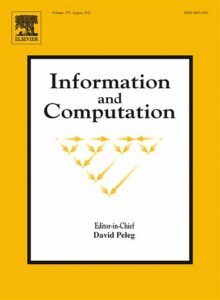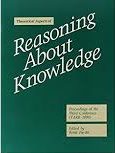bundled fragments
Publication Types:

Are Bundles Good Deals for First-order Modal Logic?
Bundled products are often offered as good deals to customers. When we bundle quantifiers and modalities together (as in ∃x□, ◊∀x etc.) in first-order modal logic (FOML), we get new logical operators whose combinations produce interesting fragments of FOML without any restriction on the arity of predicates, the number of variables, or the modal scope. It is well-known that finding decidable fragments of FOML is hard, so we may ask: do bundled fragments that exploit the distinct expressivity of FOML constitute good deals in balancing the expressivity and complexity? There are a few positive earlier results on some particular fragments. In this paper, we try to fully map the terrain of bundled fragments of FOML in (un)decidability, and in the cases without a definite answer yet, we show that they lack the finite model property. Moreover, whether the logics are interpreted over constant domains (across states/worlds) or increasing domains presents another layer of complexity. We also present the \textit{loosely bundled fragment}, which generalizes the bundles and yet retain decidability (over increasing domain models).

Generalized Bundled Fragments of First-order Modal Logic
When we bundle quantifiers and modalities together (as in $\exists x \Box$, $\Diamond \forall x$ etc.) in first-order modal logic (FOML), we get new logical operators whose combinations produce interesting \textit{bundled} fragments of FOML. It is well-known that finding decidable fragments of \FOML is hard, but existing work shows that certain bundled fragments are decidable [Padmanabha et al 2018], without any restriction on the arity of predicates, the number of variables, or the modal scope. In this paper, we explore generalized bundles such as $\forall x\forall y \Box, \forall x\exists y \Diamond$ etc., and map the terrain with regard to decidability, presenting both decidability and undecidability results. In particular, we propose the loosely bundled fragment which is decidable over increasing domains and encompasses all known decidable bundled fragments.

Bundled fragments of first-order modal logic: (un)decidability
Abstract: Quantified modal logic provides a natural logical language for reasoning about modal attitudes even while retaining the richness of quantification for referring to predicates over domains. But then most fragments of the logic are undecidable, over many model classes. Over the years, only a few fragments (such as the monodic) have been shown to be decidable. In this paper, we study fragments that bundle quantifiers and modalities together, inspired by earlier work on epistemic logics of know-how/why/what. As always with quantified modal logics, it makes a significant difference whether the domain stays the same across worlds, or not. In particular, we show that the bundle ![]() is undecidable over constant domain interpretations, even with only monadic predicates, whereas
is undecidable over constant domain interpretations, even with only monadic predicates, whereas ![]() bundle is decidable. On the other hand, over increasing domain interpretations, we get decidability with both
bundle is decidable. On the other hand, over increasing domain interpretations, we get decidability with both ![]() and
and ![]() bundles with unrestricted predicates. In these cases, we also obtain tableau based procedures that run in PSPACE. We further show that the
bundles with unrestricted predicates. In these cases, we also obtain tableau based procedures that run in PSPACE. We further show that the ![]() bundle cannot distinguish between constant domain and increasing domain interpretations.
bundle cannot distinguish between constant domain and increasing domain interpretations.

A New Modal Framework for Epistemic Logic
Abstract: Recent years witnessed a growing interest in non-standard epistemic logics of knowing whether, knowing how, knowing what, knowing why and so on. The new epistemic modalities introduced in those logics all share, in their semantics, the general schema of ![]() , e.g., knowing how to achieve
, e.g., knowing how to achieve ![]() roughly means that there exists a way such that you know that it is a way to ensure that
roughly means that there exists a way such that you know that it is a way to ensure that ![]() Moreover, the resulting logics are decidable. Inspired by those particular logics, in this work, we propose a very general and powerful framework based on quantifier-free predicate language extended by a new modality x, which packs exactly x together. We show that the resulting language, though much more expressive, shares many good properties of the basic propositional modal logic over arbitrary models, such as finite-tree-model property and van Benthem-like characterization w.r.t. first-order modal logic. We axiomatize the logic over S5 frames with intuitive axioms to capture the interaction between x and know-that operator in an epistemic setting.
Moreover, the resulting logics are decidable. Inspired by those particular logics, in this work, we propose a very general and powerful framework based on quantifier-free predicate language extended by a new modality x, which packs exactly x together. We show that the resulting language, though much more expressive, shares many good properties of the basic propositional modal logic over arbitrary models, such as finite-tree-model property and van Benthem-like characterization w.r.t. first-order modal logic. We axiomatize the logic over S5 frames with intuitive axioms to capture the interaction between x and know-that operator in an epistemic setting.
